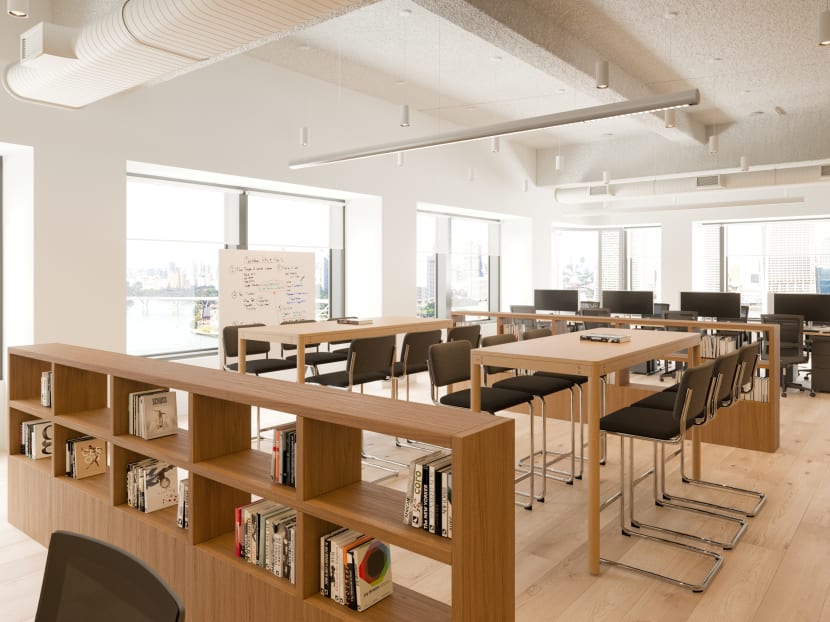Co-working spaces here to stay despite mass return to office, as more MNCs adopt 'hub and spoke' model post-pandemic
SINGAPORE — When co-working spaces first entered Singapore's office space scene, they were seen as temporary office spaces for individuals and startups to bootstrap and get their businesses rolling without the commitment of a fixed lease office space.

The WeWork co-working office that Willis Towers Watson is moving into.
- Co-working space providers are seeing increased interest from multi-national corporations looking for office space in Singapore
- One MNC that moved to a co-working space told TODAY it was to maximise their space usage as 97 per cent of employees adopt hybrid work arrangements
- Co-working space providers said MNCs now make up a significant portion of their member base
- Experts say this trend has been fuelled by hybrid work arrangements, desire for flexibility and potential cost savings
SINGAPORE — When co-working spaces first entered Singapore's office space scene, they were seen as temporary office spaces for individuals and startups to bootstrap and get their businesses rolling without the commitment of a fixed lease office space.
However, that has changed today as co-working spaces see more multi-national corporations (MNCs) downsizing their main office, opting to put some, or all, of their employees in co-working spaces across Singapore.
Experts and co-working spaces told TODAY that more MNCs are jumping onto the “hub-and-spoke” model, where they have a smaller, traditionally leased headquarters and co-working spaces.
This is in part due to larger companies adopting hybrid work arrangements, allowing employees to work from both the office and home.
MORE BUSINESSES UTILISING CO-WORKING SPACES
When global risk management and advisory company Willis Towers Watson (WTW) had to review its lease terms with its landlord at One Raffles Quay, the company decided to move to WeWork, a co-working space provider.
This was because 97 per cent of WTW’s 265 employees indicated they were going to adopt hybrid work arrangements, said Ms Choo Oi San, Singapore country leader of WTW.
The company will be moving into WeWork’s newest office building at 21 Collyer Quay, which will be opening in three phases starting July 2022.
It will have a dedicated floor “and slightly more” for employees, with close to 100 desks. Meeting rooms for collaboration will take up 30 per cent of office space, said Ms Choo.
“The advantage of using such a (co-working) model is that it provides us with the ability and flexibility to adapt to changing business needs quickly without a big upfront investment,” said Ms Choo, adding that some of WTW’s offices in North America has adopted co-working spaces as well.
“The membership to use the space is also shorter and we can scale up easily and quickly if we need additional space within the central business district.”
WTW employees can also work at other co-working offices supported by WeWork, or use the community floor in their upcoming Collyer Quay office.
For co-working space providers like WeWork and JustCo, they are getting more business from companies seeking flexible work arrangements post-pandemic – especially from MNCs like WTW.
WeWork has seen occupancy in its Singapore spaces increase by 20 per cent from March 2021 to March 2022.
Mr Balder Tol, general manager for Australia and Southeast Asia, said that WeWork had also seen the highest number of workers utilising its space in March 2022 since the start of the pandemic.
As the pandemic forced people to work from home or from offices with reduced capacity limits, WeWork has seen a "significant increase" of members with more than 500 full-time employees in the last two years.
These MNCs now make up more than half of WeWork members in Singapore, he said.
For its newest office at 21 Collyer Quay, more than 80 per cent will be occupied by large corporations.
"Having gone through the pandemic, companies are now more sensitive to their real estate commitments and this has driven demand for flexible workspaces like WeWork," said Mr Tol.
Similarly, JustCo foresees that demand for its co-working space will gain further momentum as hybrid work becomes a norm and more businesses with expiring fixed leases look toward flexible co-working spaces.
Mr Michael Sim, vice president and head of JustCo Singapore and Korea, said: "During the pandemic, we noticed that hot-desking became more popular as individuals sought a 'third space' outside of their home and regular office."
The co-working space provider, which started operations in Singapore in 2011, has seen large enterprises – which it defines as businesses with more than 1,000 employees, often with a regional or global presence – expanding their co-working usage.
While these larger enterprises had, on average, bought memberships for 73 workstations in the last quarter of 2021, Mr Sim said that number has increased to 85 workstations in the first quarter of 2022.
He noted that large enterprises and MNCs have made the switch to allow their employees to choose where to work across JustCo’s 18 co-working spaces, which allows them to cut commuting time.
Mr Sim also said that some members have expanded the number of workspaces they lease from JustCo, but did not disclose any numbers.
As for Switch, a workspace-on-demand platform with booths across Singapore owned by JustCo, it has seen an uptick in online bookings.
Switch has more than 100 work booths and 70 co-working space providers housed on its platform. It has over 60,000 users across Asia.
"Our data shows more businesses have started to adopt Switch as part of their flexible working arrangements," said Switch vice president (go-to-market) David Zhao, who did not disclose how many businesses have adopted the platform.
"They would use Switch to select a specific location or conference room for regular weekly meetings while allowing their staff to work from home on other days... They only pay for what they use."
Compared to the last quarter of 2021, Switch's bookings increased by 20 per cent in the first quarter of 2022.
HOLIDAY WHILE ON SHIFT: HOTELS TARGET WORKING TOURISTS
When the pandemic first hit, hotels were forced to find new revenue sources as border closures halted the tourism industry.
Some turned towards maximising their hotel space and lounges, turning them into co-working spaces for office workers to have a conducive working environment while offices were forced to shut.
However, despite offices being allowed to fully reopen and tourism resuming, some are keeping their co-working packages as they turn to a new target audience: Travellers looking to mix business and leisure.
Among them is Furama Hotels, which has opened co-working spaces at two of its hotels — Furama City Centre and Furama RiverFront — since August 2020.
A spokesperson from the hotel group said each of its hotels sees a daily average of 30 workers in 2022, up from 25 in 2021.
"For us, the co-working business vertical is here to stay... We are of the belief that remote work is more than a pandemic-exclusive phenomenon," the spokesperson said.
With people more comfortable with remote work arrangements, Furama Hotels said that a growing trend of "work-cations" — where employees work while on vacation — will bring in tourists who need its co-working space.
This group of tourists mixing business with leisure is what Millennium Hotel and Resorts in Singapore foresees will pick up its demand for its "work from hotel" co-working packages.
The group started offering the packages at The Orchard Hotel Singapore, Grand Copthorne Waterfront, Copthorne King's Hotel and M Social Singapore in October 2020, said Mr Paul Er, vice president for sales at Millennium Hotels and Resorts.
The group had received an average of 35 bookings a day per hotel between October and November 2020 when working from home was the default. With the reopening of offices, the number of bookings has slowed to just 35 a month.
Mr Er said that the group would continue offering its co-working packages despite the falling numbers.
"While take-up rate for our “work from hotel’ packages might dip, there is still a need for such services as the ‘work from anywhere’ concept has given rise to travellers mixing business and leisure, and digital nomads," said Mr Er.
"Business travellers tend to extend their business trips to relax, while digital nomads spend an extended period of time in a single location before moving on to the next adventure."
FLEXIBILITY ATTRACTS MNCS, FORTUNE 500: EXPERTS
Chief executive officer of Edmund Tie Desmond Sim said that there is a growing trend of large MNCs looking to put part of their workforce in co-working spaces.
“They usually have a traditional lease space to put their ‘core’ team and a co-working space for other employees who can adopt flexible work arrangements,” said Mr Sim.
“Employees have less commuting time because they can work from their nearest (co-working) office, and utilise facilities provided instead of just a centralised location which MNCs must commit to for years at a time.”
Mr Sim also noted that landlords like CapitaLand and Landlease have caught onto the trend, partnering with third-party providers or becoming co-working space providers themselves.
Mr Nicholas Mak, head of research and consultancy at ERA Realty Network, said that MNCs looking to expand into the Asia market are attracted to co-working spaces due to their flexible leases, which allow them to rent a temporary space for a few employees while they test the market.
“If they get a traditional lease space and wish to terminate it, for whatever reason, they may need to find a replacement tenant or pay a penalty to their landlord,” he said, adding that co-working spaces provide flexibility to expand or downgrade their office space with their workforce.
However, he pointed out that in the long run, co-working spaces might be pricier for large corporations if they are not strategic with their space utilisation.
Ms Tricia Song, head of research at CBRE, said that some MNCs had been moving into co-working spaces before Covid-19 struck, but the pandemic had slowed this trend with most adopting work-from-home arrangements.
However, Ms Song believes that the trend should pick up again as companies adopt hybrid work arrangements, which spell cost savings if co-working spaces are adopted.
When asked what implications this will have on the traditional leased market, Ms Song noted that most co-working operators also lease space from landlords or have partnered with them.
“We expect the growth of the co-working market to be symbiotic with the office space market and the take-up of co-working spaces post-pandemic bodes well for the office space market,” she said.













